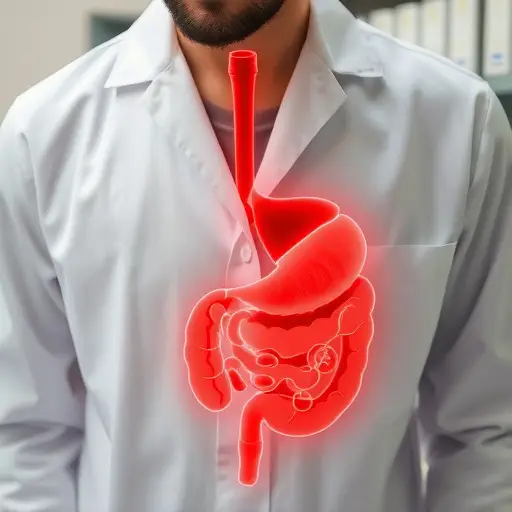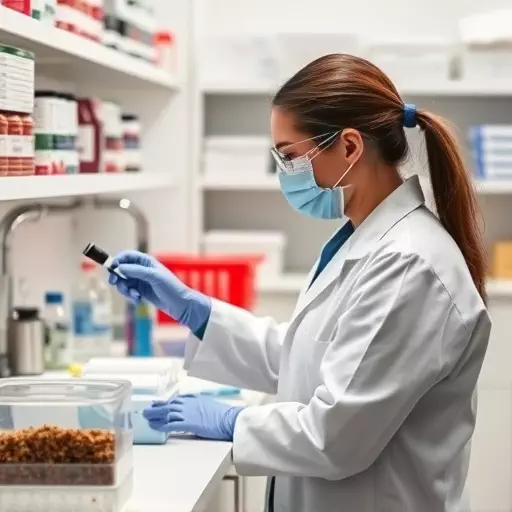Genetic panels, available through specialized lab work in Flint-Traverse City and Bay City, have transformed cancer risk assessment. These advanced tools analyze genes linked to cancer development, providing early detection of hereditary breast cancer and other conditions like liver fibrosis. Non-invasive methods, such as evaluating liver fibrosis and functional stool analysis for digestive health insights, complement genetic testing. This comprehensive approach empowers healthcare professionals in Bay City to tailor prevention strategies to each patient's unique genetic profile, improving outcomes and promoting holistic well-being.
Genetic panels are transforming the way we approach hereditary breast cancer. This innovative tool offers a comprehensive solution for early detection, revolutionizing patient care in regions like Flint-Traverse City and Bay City. By analyzing specific genetic markers, these panels provide insights beyond mammograms, screening for liver fibrosis and digestive health issues using non-invasive lab tests such as functional stool analysis. Understanding genetic panels is key to harnessing their potential in preventing and managing cancer.
- Understanding Genetic Panels: Unveiling the Tool for Hereditary Cancer Detection
- The Process: From Lab Work in Flint- Traverse City to Bay City
- Beyond Breast Cancer: Evaluating Liver Fibrosis and Digestive Health with Non-Invasive Labs
Understanding Genetic Panels: Unveiling the Tool for Hereditary Cancer Detection

Genetic panels have emerged as powerful tools in the field of medical science, particularly for identifying hereditary breast cancer risks. These advanced diagnostic tools involve a comprehensive analysis of multiple genes simultaneously, providing valuable insights into an individual’s genetic makeup and potential health predispositions. In the context of lab work in Flint-Traverse City or Bay City, these panels offer a non-invasive approach to screening for hereditary cancers.
By evaluating various genes associated with cancer development, genetic panels can uncover hidden mutations that might otherwise go undetected through traditional methods. For instance, assessing liver fibrosis with non-invasive lab tests or exploring functional stool analysis for digestive health insights, genetic panels provide a holistic view of an individual’s health status. This early detection capability is crucial in managing and preventing hereditary breast cancer, ensuring better patient outcomes and empowering healthcare professionals to make informed decisions tailored to each patient’s unique genetic profile.
The Process: From Lab Work in Flint- Traverse City to Bay City

The process of identifying hereditary breast cancer through genetic panels involves a meticulous journey from Flint-Traverse City to Bay City, showcasing the integration of advanced lab work and non-invasive testing methods. Initially, patients undergo specialized lab work in Flint-Traverse City, where skilled professionals meticulously analyze blood or tissue samples to detect specific gene mutations associated with an increased risk of breast cancer. These insights are crucial for tailoring personalized prevention strategies.
Beyond traditional lab work, evaluating liver fibrosis with non-invasive lab tests and functional stool analysis offer additional diagnostic avenues. Such innovative approaches allow healthcare providers in Bay City to gain deeper insights into a patient’s digestive health, further refining the assessment of hereditary risks. This comprehensive evaluation ensures that patients receive tailored care, leveraging advancements in both genetic testing and non-invasive diagnostics.
Beyond Breast Cancer: Evaluating Liver Fibrosis and Digestive Health with Non-Invasive Labs

In addition to assessing risk factors and familial history, modern genetic panels offer a comprehensive approach to cancer prevention by providing insights beyond breast cancer. For patients in Flint-Traverse City or Bay City seeking a deeper understanding of their health, non-invasive lab tests have emerged as valuable tools. Evaluating liver fibrosis using these advanced methods can reveal underlying conditions that may contribute to overall health and increase susceptibility to various cancers.
Functional stool analysis is another crucial component, offering a window into digestive health. By analyzing stool samples, healthcare providers can identify imbalances or abnormalities in gut microbiota, which play a significant role in maintaining overall well-being. This non-invasive lab work empowers individuals to take proactive steps towards cancer prevention and promotes holistic health management in the community.
